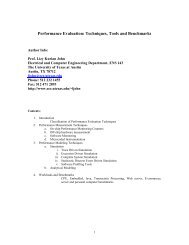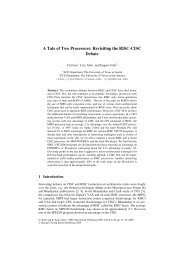Copyright by William Lloyd Bircher 2010 - The Laboratory for ...
Copyright by William Lloyd Bircher 2010 - The Laboratory for ...
Copyright by William Lloyd Bircher 2010 - The Laboratory for ...
You also want an ePaper? Increase the reach of your titles
YUMPU automatically turns print PDFs into web optimized ePapers that Google loves.
adaptations. In contrast, the disk subsystem has 18.5% of samples definable as 100 ms<br />
phases, thus providing greater opportunity to amortize adaptation costs. While chipset<br />
and memory subsystems have a large percentage of classifiable samples, they may not be<br />
viable candidates <strong>for</strong> adaptation. By also considering that most of the chipset and<br />
memory samples are close to the average, standard deviations of 0.9 Watts and 1.4 Watts<br />
respectively, there may be insufficient variation <strong>for</strong> runtime phase detection.<br />
Table 4.3 Percent of Classifiable Samples<br />
Duration (ms) CPU Chipset Memory I/O Disk<br />
CoV = 0.25<br />
1 98.5 100 100 99.5 100<br />
10 90.8 100 100 87.6 100<br />
100 70.0 100 100 85.3 100<br />
1000 36.0 100 100 96.3 100<br />
Error % 8.78 3.70 3.47 15.2 6.31<br />
CoV = 0.10<br />
1 91.7 100 100 81.1 100<br />
10 66.0 100 98.6 35.7 88.6<br />
100 43.1 100 94.4 21.0 95.6<br />
1000 9.30 100 93.1 0.00 95.0<br />
Error % 4.60 3.70 3.47 6.63 6.31<br />
CoV = 0.05<br />
1 61.6 88.3 97.7 22.4 98.4<br />
10 25.5 78.0 91.2 1.70 32.1<br />
100 6.00 63.2 78.6 0.00 18.5<br />
1000 0.00 64.4 50.0 0.00 0.00<br />
Error % 3.38 3.46 2.68 3.67 2.93<br />
From these results, it is clear that distinct phases are detectable at granularities ranging<br />
from seconds to milliseconds. <strong>The</strong> next step in utilizing the phases is to combine the<br />
amplitude and duration results to direct power management strategies. An example<br />
classification is given in Table 4.4.<br />
58




